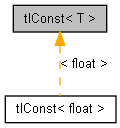
 TLIB documentation
TLIB documentation
Tracking routines often relies on some "magic" constants that vary over time according to external conditions, or that simply cannot be determined analytically. The tlConst object is a Kalman-filter based estimator of constants that can be dynamically updated. It provides an easy way to perform least-square approximation of a set of data without memorization.
Public Member Functions | |
| tlConst () | |
| tlConst (T val, float pCv, int tol=-1) | |
| tlConst (T val, float eCv, float pCv, float mCv, int tol=-1) | |
| virtual | ~tlConst () |
| int | init (T val, float pCv, int tol=-1) |
| int | init (T val, float eCv, float pCv, float mCv, int tol=-1) |
| int | setVal (T val) |
| int | setParam (float pCv, int tol=-1) |
| int | setParam (float eCv, float pCv, float mCv, int tol=-1) |
| int | setTol (int tol) |
| int | update (T val) |
| int | getTol () |
| T | getVal () |
| T | getNext () |
| float | getState () |
| float | getEstimate () |
Constructor, initialize the most significant Kalman filter parameter (process covariance).
| init | initial value of the constant | |
| pCv | process covariance | |
| tol | tolerance for input values [%], -1 for no input filtering |
| tlConst< T >::tlConst | ( | T | init, | |
| float | eCv, | |||
| float | pCv, | |||
| float | mCv, | |||
| int | tol = -1 | |||
| ) | [inline] |
Constructor, initialize all Kalman filter parameters.
| init | initial value of the constant | |
| eCv | initial estimate covariance | |
| pCv | process covariance | |
| mCv | measurment covariance | |
| tol | tolerance for input values [%], -1 for no input filtering |
| int tlConst< T >::init | ( | T | init, | |
| float | pCv, | |||
| int | tol = -1 | |||
| ) | [inline] |
(Re)initialize the constant, that is, set the most significant Kalman filter parameter (process covariance).
| init | initial value of the constant | |
| pCv | process covariance | |
| tol | tolerance for input values [%], -1 for no input filtering |
| int tlConst< T >::init | ( | T | init, | |
| float | eCv, | |||
| float | pCv, | |||
| float | mCv, | |||
| int | tol = -1 | |||
| ) | [inline] |
(Re)initialize the constant, that is, set all Kalman filter parameters.
| init | initial value of the constant | |
| eCv | initial estimate covariance | |
| pCv | process covariance | |
| mCv | measurment covariance | |
| tol | tolerance for input values [%], -1 for no input filtering |
| int tlConst< T >::setVal | ( | T | init | ) | [inline] |
Set the current best estimate for the constant value; the value is cast to the template type.
| init | value to reset the constant to |
| int tlConst< T >::setParam | ( | float | pCv, | |
| int | tol = -1 | |||
| ) | [inline] |
Set the most significant Kalman filter parameter (process covariance).
| pCv | process covariance | |
| tol | tolerance for input values [%], -1 for no input filtering |
| int tlConst< T >::setParam | ( | float | eCv, | |
| float | pCv, | |||
| float | mCv, | |||
| int | tol = -1 | |||
| ) | [inline] |
Set all Kalman filter parameters.
| eCv | initial estimate covariance | |
| pCv | process covariance | |
| mCv | measurment covariance | |
| tol | tolerance for input values [%], -1 for no input filtering |
| int tlConst< T >::setTol | ( | int | tol | ) | [inline] |
Set the tolerance on input values. Values that do are not within tolerance [%] of the current value will not be taken into account.
| tol | tolerance for input values [%] -1 disables input filtering |
| int tlConst< T >::update | ( | T | input | ) | [inline] |
Update the constant with new data.
| input | new input to the constant |
| int tlConst< T >::getTol | ( | ) | [inline] |
Return the tolerance filter for input values [%].
| int tlConst< T >::getVal | ( | ) | [inline] |
Return the current best estimate for the constant value; the value is cast to the template type.
| int tlConst< T >::getNext | ( | ) | [inline] |
Return the current best prediction for the next constant value; the value is cast to the template type.
| template< typename T > float tlConst< T >::getState | ( | ) | [inline] |
Return the actual best estimate for the constant value; the value is NOT cast to the template type.
| float tlConst< T >::getEstimate | ( | ) | [inline] |
Return the actual best prediction for the next constant value; the value is NOT cast to the template type.